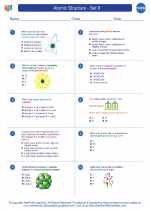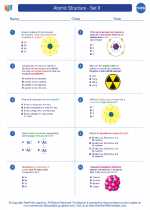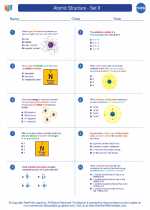Nuclear Fission
Nuclear fission is a nuclear reaction in which the nucleus of an atom is split into smaller parts, releasing a large amount of energy. This process is the basis for nuclear power plants and nuclear weapons.
Process of Nuclear Fission
In nuclear fission, the nucleus of an atom, typically a heavy isotope such as uranium-235 or plutonium-239, is bombarded with a neutron. This causes the nucleus to become unstable and split into two smaller nuclei, along with the release of additional neutrons and a large amount of energy in the form of gamma rays and kinetic energy.
Energy Release
The energy released during nuclear fission is due to the conversion of mass into energy, as described by Einstein's famous equation, E=mc^2. The total mass of the products of fission is slightly less than the mass of the original nucleus, and this "missing" mass is converted into energy according to the equation.
Applications of Nuclear Fission
Nuclear fission has both peaceful and destructive applications. In nuclear power plants, the energy released from fission is used to produce electricity through the generation of steam, which drives turbines connected to generators. On the other hand, nuclear fission is also the principle behind nuclear weapons, where the rapid release of energy in a controlled chain reaction leads to a powerful explosion.
Study Guide:
- Describe the process of nuclear fission.
- Explain the energy release during nuclear fission.
- Discuss the applications of nuclear fission in both peaceful and destructive contexts.
- Compare and contrast nuclear fission with nuclear fusion.
- Explain the concept of critical mass and its relevance to nuclear fission reactions.
◂Chemistry Worksheets and Study Guides High School. Atomic Structure - Set II

 Worksheet/Answer key
Worksheet/Answer key
 Worksheet/Answer key
Worksheet/Answer key
